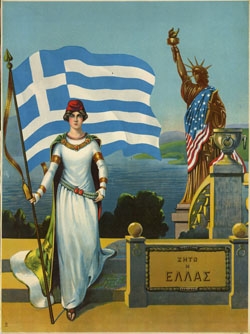Philhellenism Workshop Scope and Content

Philhellenism, Philanthropy, or Political Convenience? American Archaeology in Greece
A Workshop Organized by the American School of Classical Studies at Athens, May 18th 2010.
The United States, for more than 100 years, has played a significant role in the social and political life of Greece, one, however, that changed dramatically in the course of the 20th century. For most of this period, the American School of Classical Studies at Athens (ASCSA) has controlled archaeological activities by Americans and has served as the principal base for American archaeologists in Greece. The mission of the ASCSA has been, and continues to be, the promotion of archaeological research and the teaching of Greek history and philology.
Although, as a non-governmental organization, ASCSA ostensibly is political neutral, because of its long presence in Greece, spanning more than half the life of the modern state, its members have at times exercised power in Greek affairs while serving as significant forces in the creation, promotion, and provision of Greek culture in North America (and elsewhere). Arguably the influence of ASCSA has been greater than that of a similar foreign cultural institution in another country, in part because the past has played such a significant role in shaping national identity in the modern Greek state and in part because of the close political relationship that existed between Greece and the United States during much of the 20th century.
Since ASCSA represents a consortium of North American universities, its policies have been driven more by the needs of particular scholars, the programs of specific educational institutions, and the personal decisions of its directors and chairmen, than by any centralized decision-making authority in Washington.
The decisions of leaders in ASCSA have frequently reflected deep-seated philhellenic beliefs that often have coincided with the official views of the Greek government. Nonetheless, the deep social-networking that has resulted from the long presence of American archaeologists has made it possible to advance archaeological and other research programs that would otherwise not have been possible; while at the same time it has greatly facilitated the development of social infrastructure in Greece, particularly that of schools and charitable institutions.
The history of ASCSA also reflects the experiences of American NGOs (non-governmental organizations) abroad and their evolving relationships with their home governments. More generally, at least in some small way, the history of ASCSA also mirrors the history of American involvement in Greece.
To explore some of the issues outlined above, the American School of Classical Studies at Athens will host a one-day workshop in May 18th, 2010: Philhellenism, Philanthropy, or Political Convenience? American Archaeology in Greece, with the participation of American and Greek scholars (by invitation only). Participants will receive individual invitations with more information.
Topics to be discussed:
-American archaeologists in Greece exercising power in Greek affairs in order to advance the ASCSA’s research interests.
-American archaeology in Greece serving as a significant force in the creation, promotion and provision of Greek culture in North America.
-The independence of American School of Classical Studies from the US government and the role of American philanthropic trusts in funding archaeological work in Greece.
-American archaeology in Greece in support of the development of social infrastructure in Greece, particularly of schools and charitable institutions.
ORGANIZERS:
Professor Jack L. Davis, Director (jack.davis@ascsa.edu.gr)
Dr. Natalia Vogeikoff-Brogan, Archivist (archivist@ascsa.edu.gr)
American School of Classical Studies at Athens, Souidias 54, Athens 106 76, Greece.
Tel. 213 0002400 – Fax: 210 - 72 50 584. Please address all correspondence to Natalia Vogeikoff-Brogan.